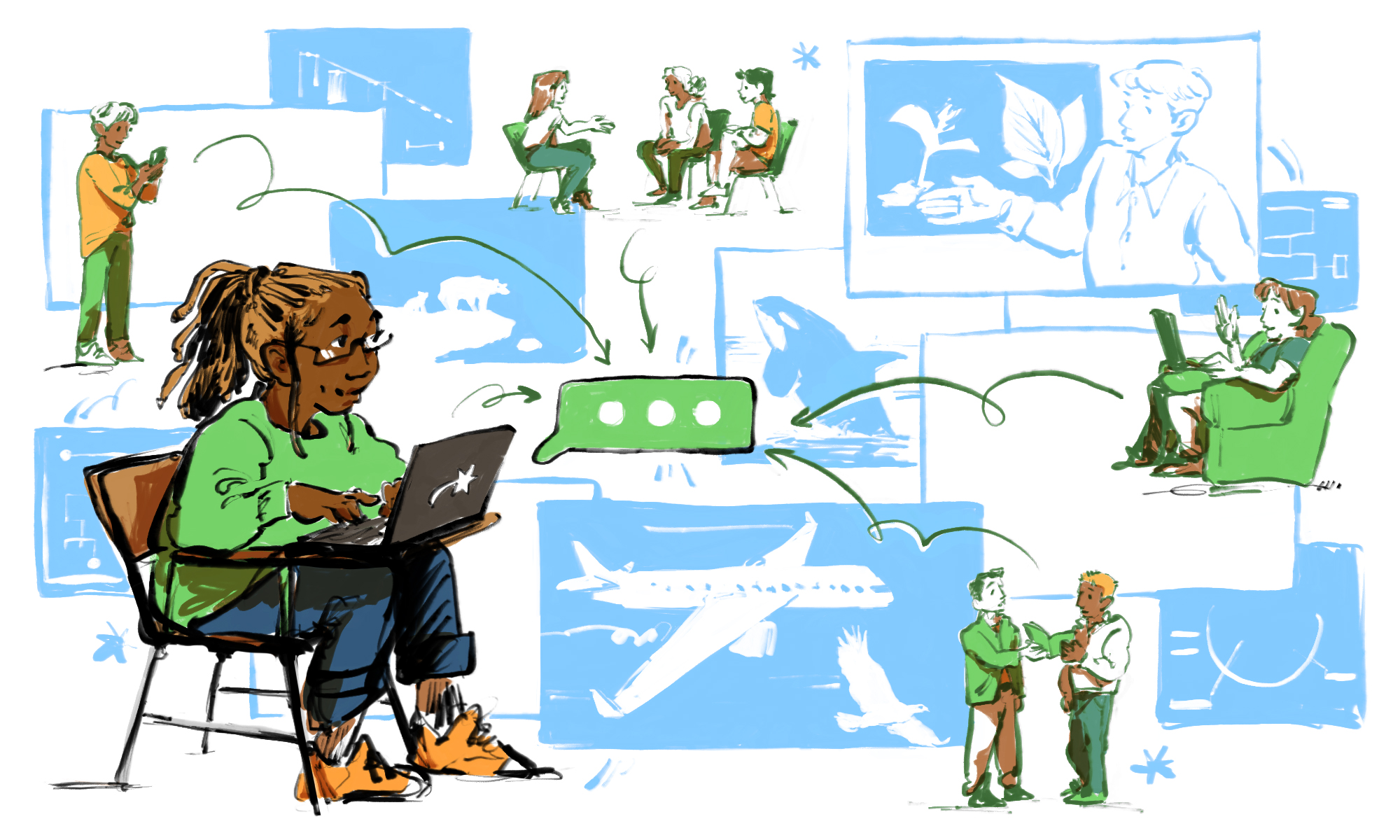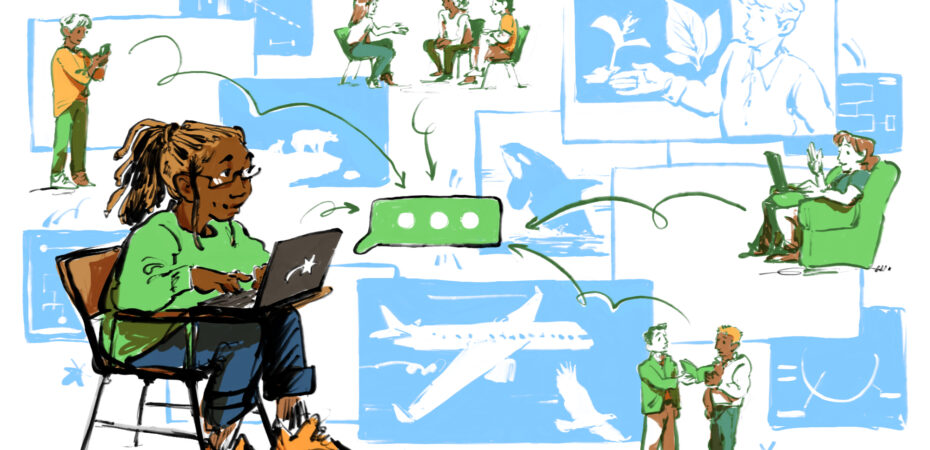
In this post, Jane McKie and Lynda Clark from the Edinburgh Futures Institute (EFI) showcase their new postgraduate programmes, highlighting how their interdisciplinary courses equip students from diverse disciplinary backgrounds to work together in envisaging collaborative solutions to global challenges. This post is part of the June-July Hot Topic series: Showcasing the Edinburgh Futures Institute ↗️.
A look at the names of the postgraduate programmes launched by EFI this year and those being presented for the first time next year gives a flavour of their scope: Creative Industries↗️, Data Inequality and Society↗️, Data and AI Ethics, Education Futures↗️, Future Governance↗️, Narrative futures: Art, Data, Society↗️, Circular Economy↗️, Service Management and Design↗️,Sustainable Lands and Cities↗️, and Planetary Health↗️. All of the programmes are designed to introduce students to multiple perspectives, and all are offered in the context of the pressing need for global change. They are, in a sense, problem-led, and they hope to give students from diverse disciplinary backgrounds the chance to work together in a constructive, interdisciplinary way to prepare for and tackle change.
Some of this has and will continue to arise organically from the mix of backgrounds of EFI staff and students and the interactions between them. But there is an interdisciplinary imperative hardwired into the design of courses, and especially into the overarching programmes that are themselves supported by a shared interdisciplinary core suite of courses: Interdisciplinary Futures↗️, Text Remix↗️, Insights Through Data↗️, Building Near Futures↗️, Representing Data↗️, and Ethical Data Futures↗️. In addition to encouraging speculative methods and methodologies, these core courses are designed to impart familiarity with key data skills such as introductory coding and data representation, all with an eye to the ethical questions raised by existing and emergent technologies.
Taking two of the core courses as examples – Interdisciplinary Futures and Text Remix – as staff, we work across Schools and Colleges. Interdisciplinary Futures arose from collaboration between staff in Design, Creative Writing, and Informatics. The course aims to introduce students to interdisciplinary thinking and collaboration through a variety of creative group and individual activities drawn from these disciplines. For example, individually, students create their ‘intellectual autobiography’: a visualisation of the ways in which different kinds of disciplinary and non-academic knowledge have contributed to their current way of working. This reflection helps them develop a greater sense of self-awareness, so that when they come together with students from other disciplines to tackle a group task (imagining a potential solution to a real-world issue such as climate change or sustainability), they are better equipped to identify blind spots and assumptions in their own and other disciplines.
Text Remix arose from conversations between staff in Creative Writing and Mathematics about the resemblance between procedural writing games and the steps and constraints of coding, conversations that resulted in a first semester postgraduate core course, that teaches students basic coding through poetry techniques and language games such as the generation of nonsense words, exquisite corpse, blackout, OULIPO’s N+7 and cutup. In addition to hands-on activities in the classroom (and online using Miro), students are invited to mirror these activities in Python using Jupyter Notebooks, and to further extend them in creatively stimulating ways, including a Notebook embedding GPT2 (which will be updated to GTP4 for 23/24). Class-based coding activities are contextualised in asynchronous discussions about the possibilities and limitations of AI creation, and students work in multi-disciplinary teams to present and write-up a final group project involving some aspect of analysis (for example, a sentiment analysis of selected texts; these could be presented in playful ways), as well as working individually to assemble and reflect on short creative folios. Like all EFI courses, students are placed at the heart of the learning journey, with an emphasis on group work extending beyond the physical classroom to synchronous and asynchronous online students. In the case of Text Remix, we found that the underlying analogy between coding and procedural games, coupled with a blend of different physical and digital processes, was a spur to individual creation and human/machine co-creation.
In all EFI courses, students embed their discoveries by being invited to make connections to their past learning and experience – whether that be academic, work-related, or informal – and to pool perspectives to arrive at tentative solutions to problems within groups. This is key to our interdisciplinary approach, and it enables students not only to synthesis ideas but also to support one another in developing critical thinking skills. The approach is firmly relational and, ambitiously, it is delivered at scale. Synthesis and opportunities for critical thinking are features of many good courses naturally, but here it is foregrounded and magnified. We are at a comparatively early stage in the evolution of the programmes and already, as staff, we ourselves are learning a huge amount from working with colleagues across the institution and with students who have diverse disciplinary backgrounds and perspectives. It helps to have a playful ethos too – as a robust and well-supported living educational experiment, EFI is a pioneer in the University’s commitment to interdisciplinarity.
 Jane McKie
Jane McKie
Jane has poetry collections with Cinnamon, Mariscat, Polygon, and Blue Diode (forthcoming). A Senior Lecturer in Creative Writing at the University of Edinburgh and an Edinburgh Futures Institute Fellow, she is interested in collaboration across forms, writes with 12, a collective of women writers, and Edinburgh’s genre spoken word group, Writers’ Bloc. With Shore Poets, she facilitates poetry readings and music in Edinburgh. Jane teaches both poetry and fiction, focussing on concrete poetry and artists’ books, Surrealism, visual art and poetry, digital art/poetry, writing speculative fiction, and interdisciplinary studies.
 Lynda Clark
Lynda Clark
Lynda is Lecturer in Creative Writing (Interdisciplinary Futures) at the University of Edinburgh and a writer of novels, short stories and interactive works. Her short story collection Dreaming in Quantum (Fairlight Books, 2021) draws on her interest in the relationships between people and technology and includes ‘Ghillie’s Mum’ which won the 2018 Commonwealth Short Story Prize for Europe and Canada and was shortlisted in the 2019 BBC Short Story Award. She has worked at the British Library as an Innovation Fellow curating a collection of interactive works. Prior to joining academia, Lynda worked as a bookseller and in the videogame industry as a writer and producer.
 Kate Granholm
Kate Granholm
Kate is a BA Illustration student at Edinburgh College of Art, who is originally from the US but grew up in London. They enjoy creating artwork in response to writing, focusing especially on editorial illustration. They mainly draw digitally but keep up a printmaking practice alongside this, working with lino and risograph printing, as well as regularly attending life drawing sessions. They are a member of the artist collective G*ndershit, that aims to platform queer voices and give back to the local community.
Instagram: @katesartthings https://www.instagram.com/katesartthings↗️


